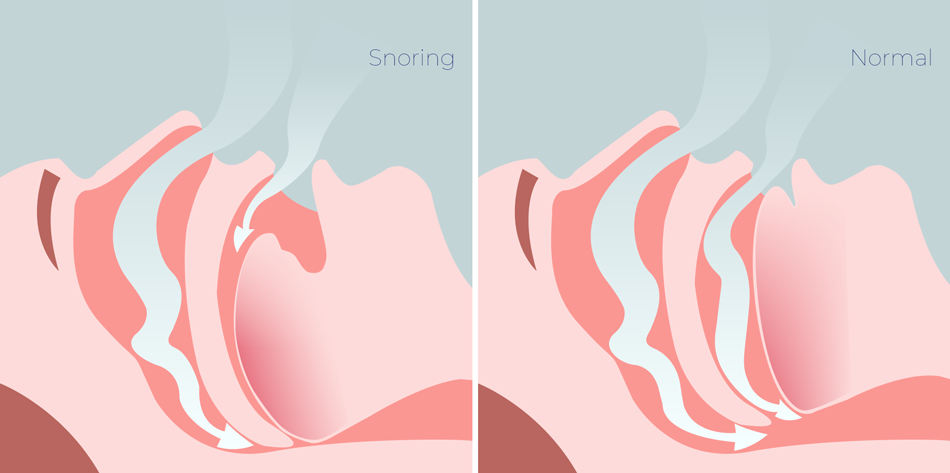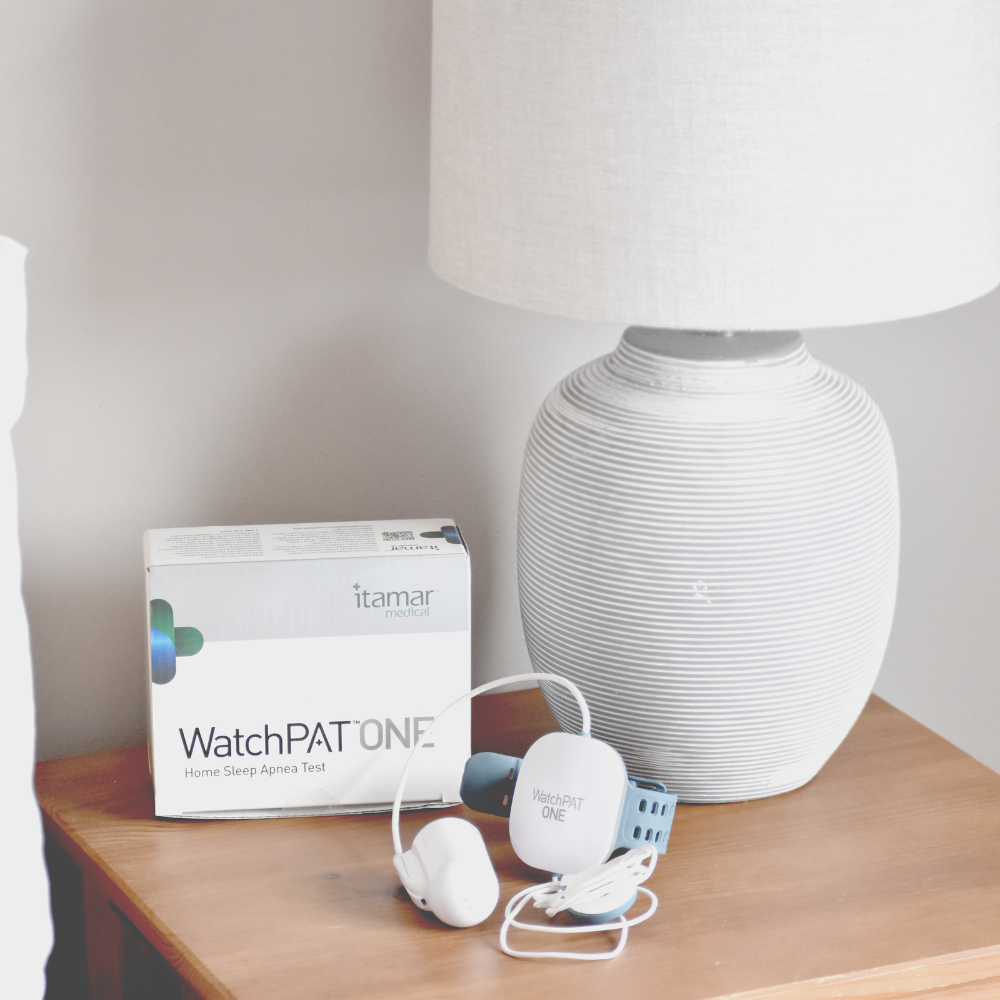Fact Checked
Intus Healthcare’s writers, customer service team, and sleep experts review and ensure this information is accurate.
Last updated on March 28th, 2025 at 10:23 am
Snoring is a common annoyance that prevents the snorer and those around them from achieving good quality sleep.
41.5% of the UK population snores, with 30 million people affected by snoring(1).
Many of the population have experienced snoring at some point, whether due to seasonal blocked sinuses or a more chronic condition.
Your snoring may be nothing to worry about; however, in many cases, snoring can be a sign of underlying health conditions.
Snoring is a key sign of Sleep Apnoea. 70-95% of snorers are estimated to have Obstructive Sleep Apnoea (OSA) (2).
Let’s look at how snoring affects our sleep, why we snore and how to stop it.
Table of Contents
What is snoring?
Snoring is the sound produced while you sleep by the vibration of soft tissues in the upper airway. When snoring occurs, it suggests there is a partial obstruction in the airways during sleep.

Snoring side effects
Regular snoring can wreak havoc on your sleep cycle; the constant interruptions to your sleep can lead to an unbearable day ahead.
You may not think your snoring is that bad, but those who know you may disagree. If your snoring affects your life, it could indicate something more significant.
So, what are some common side effects of snoring?
- Waking up choking and gasping
- Headaches in the morning
- Excessive daytime sleepiness
- Relationship issues due to loud snoring
- The risk of heart disease and cardiovascular complications
- The risk of high blood pressure and stroke
- GERD (Gastroesophageal reflux disease) and acid reflux
- Waking up with a sore throat or a dry mouth
- Mood swings, stress and mental health complications
- Waking up frequently to urinate
- Teeth grinding (bruxism), 33-54% of people with OSA also grind their teeth(3)
- Drop in your nocturnal oxygen levels
Many of these side effects are also associated with Sleep Apnoea symptoms.
Related post: Signs of Sleep Apnoea
Why do I snore when I never used to?
You may be wondering why you suddenly started snoring when you never had before. The development of snoring can be due to loss of muscle tone which is normal as we age.
What causes snoring?
The development of snoring can be caused by the following:
- Weight gain (especially around the tongue, throat or neck).
- Smoking, vaping, and excessive alcohol consumption can irritate the throat lining. Second-hand smoke can also irritate and inflame the upper airway.
- A sleeping position that blocks the airway.
- Allergies and congestion can make breathing difficult throughout the night. Breathing through your mouth due to a stuffy or blocked nose can cause the tongue to fall back.
- Different sinus conditions, such as nasal polyps and rhinitis, can cause you to snore.
- An injury to the jaw, nose and neck.
- An underactive thyroid.
- Tonsil swelling
- Hormonal changes such as menopause can make women more likely than men to snore.
- Did you know deep cleaning can cause snoring due to dust entering the airway and irritating them?
- During winter, we spend more time inside, and the build-up of dust and being around animals can trigger blockages in the airways.
What causes snoring in females?
Research has found snoring is more common in men than women (4). However, menopause, pregnancy, hormonal imbalances and weight gain can all lead to snoring(5).
Post-menopausal women have lower levels of oestrogen and progesterone; these individuals are more likely to snore (6). Although, all the above causes can also lead to snoring in women.
How snoring affects sleep
Snoring affects your sleep cycle and can prevent you from achieving the recommended hours of sleep. Snoring ultimately disrupts the quality of your sleep (and even more so, the sleep quality of your bed partner!).
Individuals who snore and may possibly have untreated OSA tend to have interrupted REM sleep. An interruption to your sleep cycle results in daytime sleepiness and under-productivity.
Your snoring may go over your head, but did you know it’s a sign of Obstructive Sleep Apnoea?
1 in 10 people that snore have Sleep Apnoea (7). OSA affects millions of people worldwide, and around 8 million in the UK have either mild, moderate or severe OSA (8). It’s a common sleep disorder that can be treated and managed effectively
What is OSA?
Obstructive Sleep Apnoea is when a person’s upper airway becomes obstructed, causing breathing pauses. These breathing pauses last over 10 seconds and can occur over 30 times per hour every night.
Untreated Sleep Apnoea can significantly reduce your life expectancy, with findings showing that individuals with moderate Sleep Apnoea have an increased risk of death by 17%. This is roughly doubled in those with severe OSA (9). Although extremely rare, it is possible to die from untreated Obstructive Sleep Apnoea. However, premature death from Sleep Apnoea is more common when left untreated, as sufferers can develop other long-term health conditions.
Related article: Can you die from Sleep Apnoea?
Is it snoring or Sleep Apnoea?
In OSA, breathing stops or is partially reduced for a minimum of 10 seconds. This results in frequent awakenings throughout the night, leading to unrefreshed sleep and daytime sleepiness.
In contrast, habitual snoring may not be a health concern, and the only way to tell the difference is by undertaking a Sleep Test.
Snoring and health conditions
Untreated OSA can increase the likelihood of other health risks, such as:
- Type 2 diabetes – 71% of patients with Type II diabetes have OSA, which may be undiagnosed and untreated (10).
- Cardiovascular disease – including stroke, hypertension, heart disease and atrial fibrillation.
- High blood pressure – nearly 40% of people with OSA have high blood pressure (hypertension) (11).
If you think you may have OSA, take our simple free Sleep Apnoea risk assessment.
7 Simple Snoring Solutions
Whether or not you have Sleep Apnoea, there are ways to stop snoring that go beyond the usual nasal strips.
How to stop snoring, seven tips:
- Change your sleeping position – Sleeping on your side helps to open your airway, preventing snoring. You could use the Somnibel Sleep Therapy Trainer; the small device vibrates when the user sleeps on their back. Successfully encouraging the user to remain sleeping on their side to prevent snoring.
- Relieve congestion, sinusitis and infections using decongestants such as nasal sprays and irrigators. A good option is the SinuPulse nasal irrigator, which cleanses your sinuses, relieving uncomfortable blockages.
- Stay hydrated to prevent your airway from becoming clogged and blocked.
- Lifestyle changes: If you’re overweight, becoming more active and losing weight could significantly reduce your snoring.
- Sleep hygiene: Create a bedtime routine and minimise screen time before you sleep.
- Quit smoking and reduce your alcohol consumption before you sleep.
- Dental devices or oral appliances (Mandibular Advancement Devices) are designed to pull your jaw and tongue forward, creating more space at the back of the throat. A proven-to-work device is the Oniris Mandibular Advancement Device which includes a 30-day money-back guarantee.
In-home sleep test
The fastest way to know if you have Sleep Apnoea is to take an In-Home Sleep Test. Our sleep experts will read your sleep data and advise the recommended treatment.
CPAP therapy is the most widely used Sleep Apnoea treatment, preventing breathing pauses and snoring.

Home Sleep Apnoea Test
The test monitors your heart rate, snoring intensity, blood oxygen levels, body positioning, and more, providing accuracy comparable to testing used in sleep clinics for in-depth sleep analysis.
The simple-to-use test takes just one night to complete, and results are returned within two working days after completion.
Our experienced NHS-qualified sleep professionals independently analyse all studies, providing follow-up advice and support.
Wrapping up
Snoring is widely associated with Sleep Apnoea. If you have symptoms of OSA, take a Sleep Test today.
Contact us if you need help or advice.
About Our Editorial Team
Danni is a degree-educated content writer passionate about helping those with Sleep Apnoea sleep better; she works closely with our clinical and customer care teams to ensure that each article is thoroughly researched and accurate.
Her writing aims to inform, support, and advise readers about Sleep Apnoea, helping to raise awareness and promote effective treatment options.
She has written many health-focused articles, reaching hundreds of readers annually, to help people sleep better and live healthier lives.
Lateisha King is an experienced Sleep Clinician with advanced training in polysomnography and respiratory health.
With over six years of experience, including at the prestigious Guy’s and St Thomas’ NHS Foundation Trust Hospital, she has conducted and reviewed more than 500 diagnostic sleep studies.
Her expertise in sleep science ensures that all articles align with the latest data and treatment protocols, providing readers with trustworthy and practical advice to improve their sleep health and overall well-being.
REFERENCES
- Davey, M., 2018. British Snoring & Sleep Apnoea Association. [online] Britishsnoring.co.uk. Available at: <https://britishsnoring.co.uk/media.php#:~:text=Snoring%20Facts,million%20people%20in%20the%20UK. Accessed: 19.09.22.
- Whyte, K. F., Allen, M. B., Jeffrey, A. A., Gould, G. A., & Douglas, N. J. (1989). Clinical features of the sleep apnoea/hypopnoea syndrome. QJM: An International Journal of Medicine, 72(1), 659–666. Available at: https://doi.org/10.1093/oxfordjournals.qjmed.a068358. Accessed: 21.08.23.
- Edwards, M. (2022, October 7). Teeth grinding & sleep apnea. SleepApnea.org. Available at: https://www.sleepapnea.org/sleep-health/teeth-grinding-and-sleep-apnea/. Accessed: 21.08.23
- Basoglu, O.K. and Tasbakan, M.S. (2017) “Gender differences in clinical and polysomnographic features of obstructive sleep apnea: A clinical study of 2827 patients,” Sleep and Breathing, 22(1), pp. 241–249. Available at: https://doi.org/10.1007/s11325-017-1482-9. Accessed: 19.09.22.
- Munoz R., Duran-Cantolla J., Martinez-Vila E., Gallego J., Rubio R., Aizpuru F., De La Torre G. Severe sleep apnea and risk of ischemic stroke in the elderly. https://pubmed.ncbi.nlm.nih.gov/16888274/. Accessed. 21.08.23.
- Chuang, L., Lin, S., Lee, L., Li, H., Chang, C., Kao, K., Li, L., Huang, C., Yang, C. and Chen, N., 2016. The gender difference of snore distribution and increased tendency to snore in women with menopausal syndrome: a general population study. Sleep and Breathing, 21(2), pp.543-547. Accessed: 19.09.22.
- The Harley Street Clinic The Harley (ed.) (2022) How common is snoring?, How Common is Snoring? | Harley Street ENT Clinic. Available at: https://www.harleystreetent.com/Blog/How-Common-is-Snoring#:~:text=Snoring%20Statistics&text=Approximately%201%20in%2010%20snorers,likely%20to%20snore%20as%20women. Accessed: 19.09.22.
- Schmoller, S. (2021, January 30). OSA estimates for the UK. OSA Estimates for the UK 2019. Available at: https://osapartnershipgroup.co.uk/clinicians/osa-partnership-group-clinicians-osa-estimates-for-the-uk#:~:text=This%20comprehensive%20review%20estimates%20that,OSA%20(8%20million%20people).Accessed: 21.08.23.
- Young, T., Finn, L. and Peppard, P. (2008) “Sleep-disordered breathing and mortality: Eighteen-year follow-up of the Wisconsin sleep cohort,” sleep, 31(8). Available at: https://doi.org/10.5665/sleep/31.8.1071. Accessed: 19.09.22.
- Pamidi, S. and Tasali, E. (2012) “Obstructive sleep apnea and type 2 diabetes: Is there a link?,” Frontiers in Neurology, 3. Available at: https://doi.org/10.3389/fneur.2012.00126. Accessed: 19.09.22.
- Surani, S.R. (2014) “Diabetes, sleep apnea, obesity and cardiovascular disease: Why not address them together?” World Journal of Diabetes, 5(3), p. 381. Available at: https://doi.org/10.4239/wjd.v5.i3.381. Accessed: 19.09.22.





